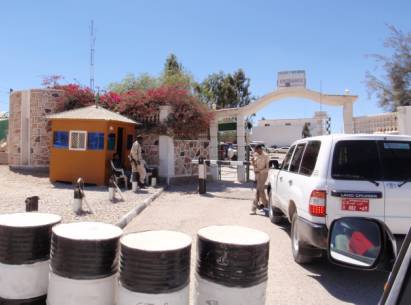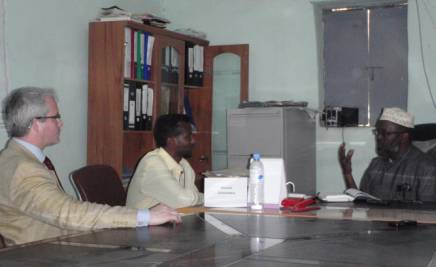Report From the Piracy Contact Group, Working Group 2, Meeting in Copenhagen
April 13, 2013 1 Comment

Private Security Guards
Cross-posted at international law girls.
In my capacity as an independent academic, as well as a representative of the prominent non-governmental organization, the Public International Law and Policy Group, I had the honor of attending the 12th meeting of the United Nations Contact Group on Piracy off the Coast of Somalia, Working Group 2, meeting in Copenhagen, on April 10-11. I will take this opportunity to briefly summarize some of the key legal issues that were discussed in Copenhagen.
First, many nations seem to be moving in favor of authorizing the use of private security guards on board their merchant vessels. The use of such private security guards is controversial, and many in the international community feel a general sense of discomfort any times states delegate their traditional duties to private entities. Others have expressed the view that the use of private security guards on board merchant vessels should be allowed only under strictly delineated guidelines and rules on the use of force. Contrary to popular belief, such guidelines and rules exist already. Several International Maritime Organization Circulars provide guidance on matters related to the employment of private security personnel on board merchant vessels. The Baltic and International Maritime Council (BIMCO) has drafted and made publicly available a standard employment contract between a shipping company and private security providers. BIMCO has also issued specific Guidance on the Rule of the Use of Force, which suggest under which circumstances private security personnel may use force, including lethal force, against suspected pirates. The International Organization for Standardization (ISO) issued additional Guidance for private security personnel on board ships, as well as a pro forma contract. Finally, the Montreux Document provides international law rules applicable to the conduct of private security providers during armed conflict. Although this Document most likely does not apply to the Somali piracy context because of the absence of armed conflict, it nonetheless sheds light on the international community’s consensus regarding the international law responsibilities of private security providers, operating in a domain otherwise reserved to state powers.
In addition to the above-mentioned guidance, international treaty law provides rules regarding the master of a ship’s duties on the high seas, in a situation where a merchant vessel may be under attack by suspected pirates, regardless of the presence of private security contractors on board. It is clear under the United Nations Convention on the Law of the Sea as well as under the SUA Convention that the master of a ship retains authority on board his or her vessel, that the master may order any private security personnel to cease using force against suspected pirates at any time, and that the delegation of power from the master to the private security personnel during a piracy incident is temporary. The general sentiment in Copenhagen was that numerous existing guidelines, principles, and treaty law obligations apply to any use of private security personnel on board merchant vessels, and that states have plenty to work with when determining whether and how to authorize the use of private security on board their own vessels.
Second, states remain concerned with legal issues related to the treatment of juvenile pirates (I had previously reported on this issue from the last Working Group 2 meeting in September 2012). In order to ensure that juvenile pirates are treated according to relevant human rights standards and practices, states have begun developing guidelines on the treatment of juvenile pirates. Such guidelines include the necessity to segregate juvenile suspects from the general prison population, to provide educational and vocational opportunities for juveniles, and to generally rehabilitate them so that they re-enter society upon their release and engage in legal, as opposed to criminal, activities. These proposed guidelines will remain the subject of future Working Group 2 meetings.
Third, states remain committed to the post-conviction transfer model: the idea that pirates, if they are successfully prosecuted and convicted in Kenya, the Seychelles, or Mauritius, will be transferred back to Somaliland or Puntland where they will serve their penal sentences. This model is important for two reasons. First, it relieves small capacity nations such as the Seychelles and Mauritius from having to detain convicted pirates for long period of time in their own prisons; prosecutorial nations can, under this model, accept more suspected pirates because they will not run out of detention space. Second and more importantly, the post-conviction transfer model allows pirates to return home – although they will not be immediately freed upon re-entering their native land, they will presumably be reunited with their families through prison visits and return to their own communities after the end of their sentences. Any post-conviction transfer requires the successful fulfillment of the following criteria: the applicant must be at least 18; he or she must waive any existing appeals (the sentence must be final); he or she must consent to the transfer; all relevant states, including the apprehending state, the transferring state, and the receiving state, must agree to the transfer. As discussed in Copenhagen, the post-conviction transfer model has been used successfully thus far, and 59 pirates have been transferred to Somaliland and Puntland as of today.
Finally, states have expressed an important concern regarding hostages. In many instances, pirate hostages spend months in captivity under very difficult conditions. Once hostages are released, they may be confused, mentally or physically injured, and may have no meaningful way of returning to their home states. Several states in Copenhagen expressed the view that it is important to create a hostage release program that would maintain contact with released hostages in order to enable them to successfully return to a normal life after captivity.
The work of Working Group 2 thus far has been outstanding. It demonstrates that states can, through joint legal efforts and cooperation, contribute significantly to the global fight against Somali piracy.





